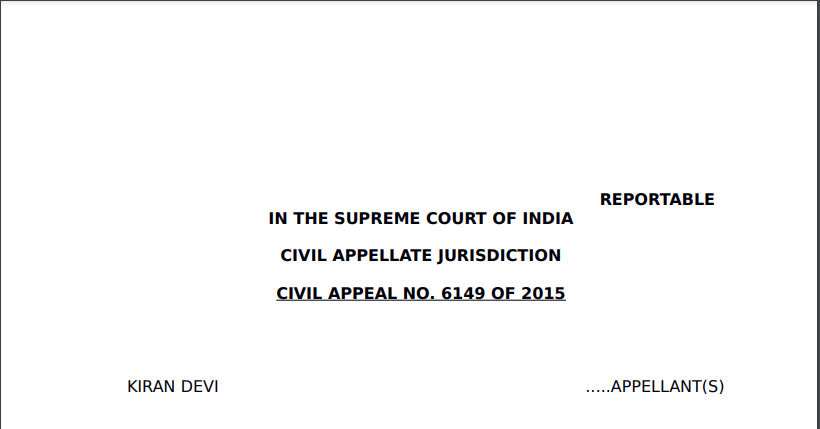Supreme Court in the case of Kiran Devi Versus The Bihar State Sunni Wakf Board
Case Covered:
Kiran Devi
Versus
The Bihar State Sunni Wakf Board
Facts of the Case:
The challenge in the present appeal is to an order passed by the High Court of Judicature at Patna dated 6.2.2013 whereby a writ petition filed by respondent No. 41 herein was allowed, holding that the tenant in the premises in question was representing a joint Hindu family and that the Karta was not competent to surrender the tenancy rights in favour of respondent No. 1-The Bihar State Sunni Wakf Board2 and consequently the induction of the appellant as a tenant by the Wakf Board was illegal. Accordingly, a direction was issued to dispossess the appellant from the suit premises and to hand over the vacant possession to the plaintiff.
The plaintiff had filed a suit for declaration before the competent civil court stating that he is a tenant in the suit premises and is entitled to continue in the suit premises as a tenant on payment of monthly rent. The basis of such declaration was that Ram Sharan Ram, the great grandfather of the plaintiff, predeceased his brother Ram Sewak Ram who died issueless and his widow predeceased him. Ram Sewak Ram was carrying out a joint family business of a hotel in the premises of the Wakf Board. Due to advanced age, he handed over the possession of the hotel business to his nephew Devendra Prasad Sinha, the grandfather of the plaintiff. The grandfather of the plaintiff succeeded to the tenancy as a member of the joint Hindu family. After his death, defendant Nos. 1 to 3 succeeded to the tenancy as members of the Joint Hindu Family. The shop was being run by Surendra Kumar, son of Devendra Prasad Sinha when the grandfather of the plaintiff fell ill. Surendra Kumar, the father of the plaintiff started paying rent to the Wakf Board. However, Surendra Kumar later joined service and the hotel was being run through the servants. The plaintiff had started running the hotel in 1988. On account of disputes over the management, the hotel was closed and it remains closed for several years. It is the plaintiff who wanted to resume the hotel business in the premises in question and thus communicated with the Wakf Board to continue the hereditary tenancy of the shop as Karta in his name.
Related Topic:
Gujarat HC in the case of M/s. AAP And Co. Versus Union of India
Observations:
A perusal of the facts on record would show that it was a contract of tenancy entered upon by the great grandfather of the plaintiff. Even if the great grandfather was maintaining the family out of the income generated from the hotel business, that itself would not make the other family members as coparceners in the hotel business. It was the contract of tenancy that was inherited by the grandfather of the plaintiff who later surrendered it in favour of the Wakf Board. The tenancy was an individual right vested with the grandfather of the plaintiff who was competent to surrender it to the landlord. The High Court has clearly erred in law by holding that since the grandfather was a tenant, the tenancy is a joint family asset. The contract of tenancy is an independent contract than the joint Hindu family business.
Thus, mere payment of rent by a great grandfather or by the grandfather of the plaintiff raises no presumption that it was a joint Hindu family business. The High Court has clearly erred in law to hold so without any legal or factual basis.
The Decision of the Court:
The pleaded stand of Plaintiff is that the hotel was closed for several years. Therefore, the liability to pay monthly rent continued to accrue upon Karta – Devendra Prasad Sinha. The question is as to whether, in these circumstances, on account of the cessation of activities of the running of the hotel, the act of the surrender of tenancy is in fact for the benefit of the joint family. The learned High Court found that the letter of surrender was not reliable or tenable. The executor of the surrender letter has admitted such surrender letter in the written statement and while appearing as a witness as DW-5. The Mutawalli Md. Salimuddin has also accepted the surrender letter in the written statement and while appearing in the witness box as DW-10. Merely for the reason that signatures in the translated copy do not tally with the Urdu copy is not sufficient to hold the surrender letter as unreliable as the translation can be incorrect but the correctness of the document in has not been disputed by the executor or by the acceptor. The said document could not have been said to be unreliable on the basis of the statement of the plaintiff who is not a party to such transaction. It is one thing to say that the document is unreliable and another to say that the document does not bind the plaintiff. We have no hesitation to hold that the document was validly proved and accepted by the Wakf Board. Therefore, the act of surrender of tenancy was for the benefit of the Joint Hindu family.
We thus hold that the order of the High Court is not sustainable for the reasons recorded above. Consequently, the present appeal is allowed. The order of the High Court is set aside and that of the Wakf Tribunal is restored with no order as to costs.
Read & Download the full Decision in pdf:
If you already have a premium membership, Sign In.
 ConsultEase Administrator
ConsultEase Administrator
Consultant
Faridabad, India
As a Consultease Administrator, I'm responsible for the smooth administration of our portal. Reach out to me in case you need help.













